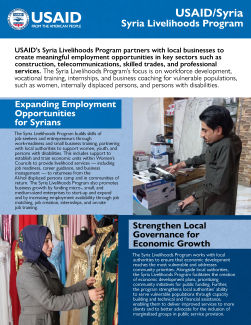OVERVIEW
USAID’s Syria Livelihoods Program partners with local businesses to create meaningful employment opportunities in key sectors such as construction, telecommunications, skilled trades, and professional services. The Syria Livelihoods Program’s focus is on workforce development, vocational training, internships, and business coaching for vulnerable populations, such as women, internally displaced persons, and persons with disabilities.
GOALS
Expanding Employment Opportunities For Syrians
The Syria Livelihoods Program builds skills of job-seekers and entrepreneurs through work-readiness and small business training, partnering with local authorities to support women, youth, and persons with disabilities. This includes support to establish and train economic units within Women’s Councils to provide livelihood services — including job readiness, career guidance, and business management — to returnees from the Al-hol displaced persons camp and in communities of return. The Syria Livelihoods Program also promotes business growth by funding micro-, small, and medium-sized enterprises (MSMEs) to start-up and expand and by increasing employment availability through job matching, job creation, internships, and on-site job training.
Strengthen Local Governance For Economic Growth
The Syria Livelihoods Program works with local authorities to ensure that economic development reaches the most vulnerable and addresses community priorities. Alongside local authorities, the Syria Livelihoods Program facilitates the creation of economic development plans, prioritizing community initiatives for public funding. Further, the program strengthens local authorities' ability to serve vulnerable populations through capacity building and technical and financial assistance, enabling them to deliver improved services to more clients and to better advocate for the inclusion of marginalized groups in public service provision.
KEY RESULTS
- In late 2023, the Syria Livelihoods Program initiated technical and financial support to the Women’s Committees in Raqqa, Tabqa, and Deir ez-Zor to establish women’s centers for economic empowerment. This ongoing work will place 600 women returnees from Al Hol and communities of return in internships, train 450 women entrepreneurs, and support 198 women-owned small businesses to start-up or expand.
- Since 2021, SLP has supported local authorities to leverage over $3 million to fund public initiatives by facilitating the creation of inclusive local development plans with public, private, civil society actors to determine community development priorities in Raqqa, Hasakah, Tabqa, and Deir ez-Zor.
- SLP provided training to more than 400 entrepreneurs with disabilities in business planning, start up, and management.
- SLP improved support for persons with disabilities in northeast Syria by launching a case referral system for job seekers and delivered career guidance training to more than 4,300 persons with disabilities. Through this system, SLP also placed 550 qualified job seekers in paid internships.
- SLP provided financial support to over 800 small businesses and matched more than 900 Syrians with new or better employers.
- In 2022, SLP increased production by 10 to 25 percent in 85 concrete block workshops across NES, increasing the supply of vital materials (cinder blocks) in the growing construction industry.


